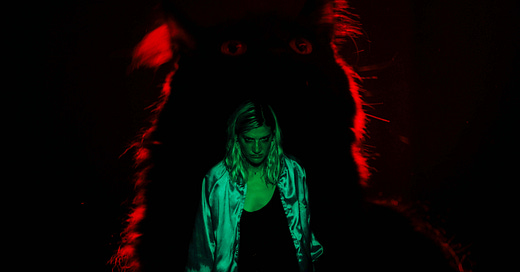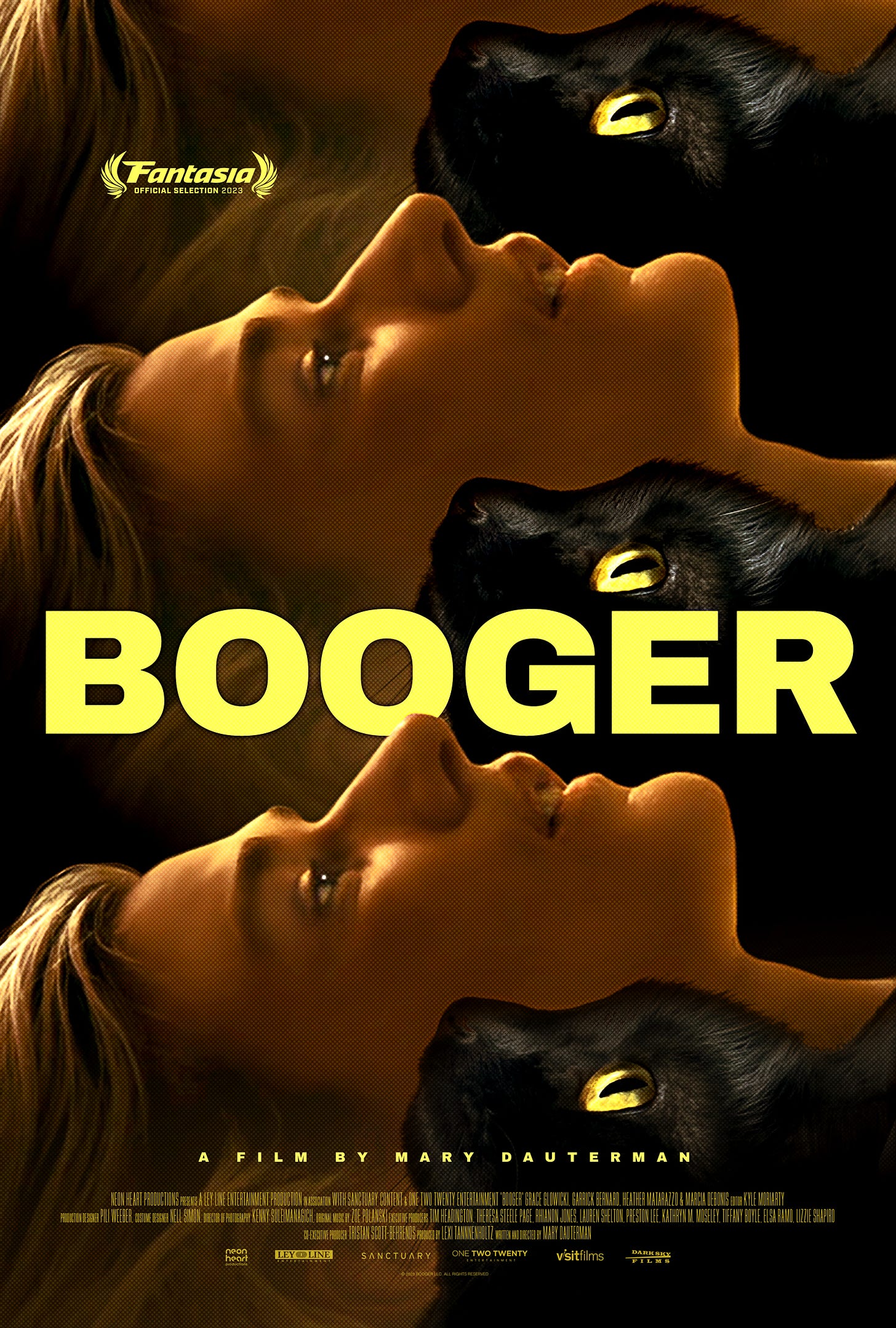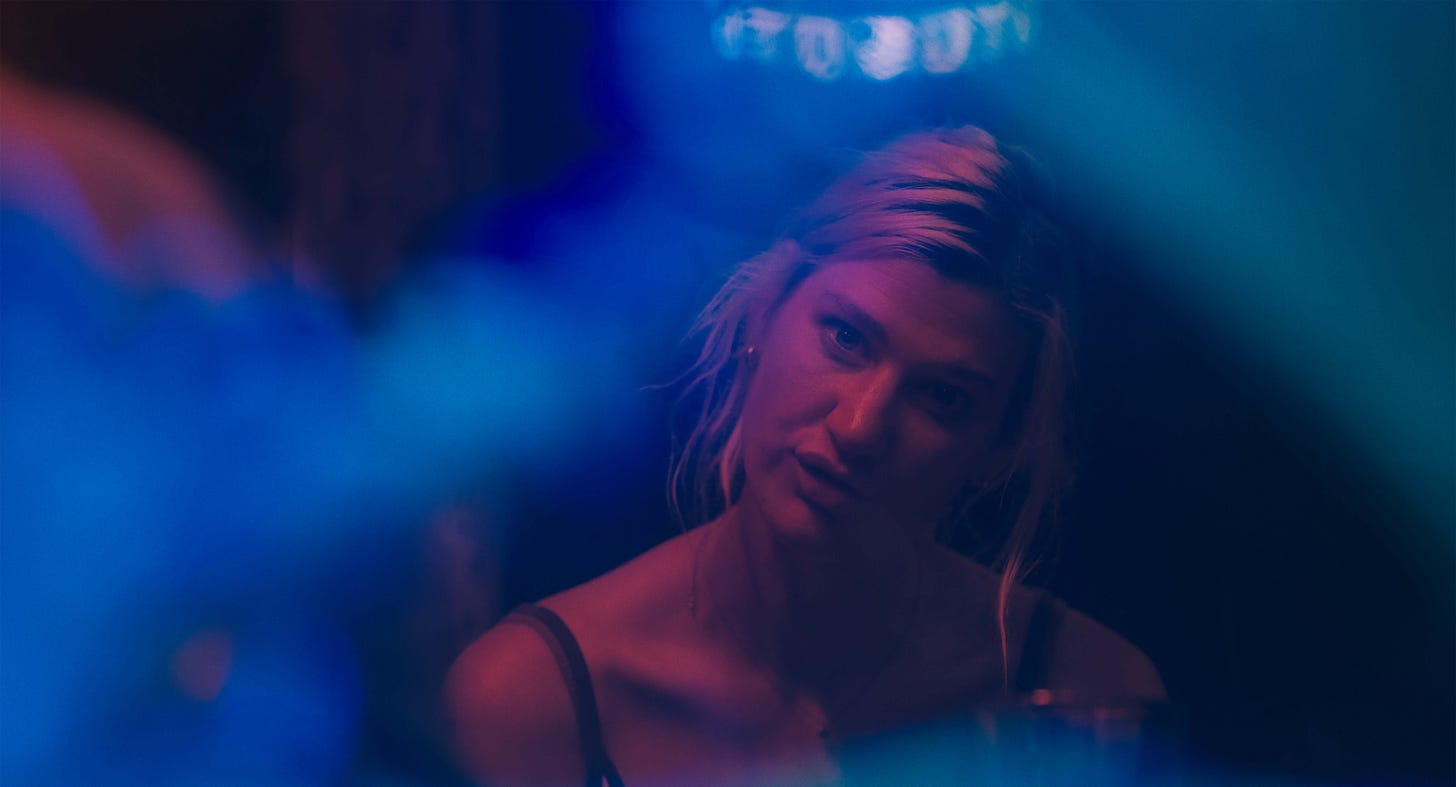Booger: A Body Horror Comedy About Cat Ladies
Interview with Booger writer and director Mary Dauterman
Feminist body horror is having a moment right now. Single cat ladies are also having a moment right now. Those two things come together in Mary Dauterman’s horror comedy Booger, now available on VOD.
Anna (Grace Glowicki) never intended to own a cat, but after her best friend Izzy (Sophia Dobrushin) died, she took over the care of Izzy’s cat Booger. When Booger bites Anna and then runs away, Anna is distraught, feeling like she let down her best friend. As Anna finds herself trying to process her grief, she also has to deal with some odd changes to her body.
Booger is an interesting blend of horror and comedy. I had the opportunity to talk to writer and director Mary Dauterman about her work on the film. Check out our interview below.
Alise Chaffins: Thank you so much for joining me today, Mary. I really appreciate it. So I think it's kind of great that we have this cat lady movie out at a time when cat ladies are getting some national attention. Can you talk a little bit about why you chose a cat as the avatar for grief in this film?
Mary Dauterman: Yeah. I mean, not to spoil anything, but I am a crazy cat lady myself. I have two cats, and I foster kittens in Brooklyn, and I just love them. But also, the thing about cat behavior and cat emotions is you can't just get them to do what you want them to do. You have to be on their terms. They're a little bit spiky and stabby and scary, but also so cute. So there are things about them that felt like it was weirdly layering onto grief and withdrawal. Like just the behavior of pets when they're sick or ill is to go away and hide. So, it felt strangely relevant for this character's journey. And then, of course, Grace Glowicki brought it to a whole different level by really mimicking cat behaviors. So it's the combination of the story itself, my obsession with cats, and then what Grace brought to it in the film.
AC: Yeah, absolutely. So obviously, this is a horror film, and it's a film that really explores death and loss, but it also just has a lot of humor in it. Can you talk about just the writing of it, trying to blend all of those elements together? And how you tried to balance that?
MD: Totally. I think of myself more as a comedy director. All of the shorts I've made in the past, and my commercial work have definitely been more weird. That's just what I like, in the zone I feel comfortable in. But then I found myself writing this really emotional story and was a little bit nervous. I was like, ‘Oh, am I ready to go here?’ But as I was working on this movie, I realized, yeah, I want to go on this emotional journey. It's scary, but I want to push myself. And I also feel like I have so much to say about friendship and loss. So that all was coming together in the overall narrative, but I always kind of had a comedic or absurdist take on some of the things that were happening. And I think the other thing was just casting really funny people. Grace cracks me up. She was able to really toe the line of being both extremely believable and emotional, and still making things have this refreshing comedy to them. And then the rest of our cast, there's a lot of really great stand-up comedians. Garrick Bernard, her boyfriend, is a stand-up and a comedy writer. Richard Perez is this amazing up-and-coming comedian here in New York who has a role as her coworker. So yeah, everyone on the cast was just cracking me up.
AC: Yeah, that definitely comes through. I think, because the comedy is really strong in this, it kind of surprised me, just given the rest of the of the film, how that worked. So, one of the things that I think makes body horror effective is the sound design around it. Can you talk about working with your sound designer and how the two of you talked about that aspect of it?
MD: Yeah, it was really fun and really disgusting. Vinny Alfano did the sound design, and we talked a lot about how I wanted it to feel even before shooting. I was like, this is wet and drippy and icky and uncomfortable. So, there were all these key moments to amplify. And the other thing that was really fun was thinking about Grace's transformation into a creature. Like, what sensorially is happening with her that feels different? And the sound was huge. Like, what is she paying attention to? What would it feel like to have cat senses? And that was a big thing we explored in the sound.
AC: Yeah, for sure. Can you talk some about the direction that you gave to Grace in the cat elements and what she brought to it? How the two of you worked together on that?
MD: it was really fun and really crazy in the lead-up. Grace is a dog person. She has a dog. She doesn't have a cat. So, I just constantly sent her videos of my cat, and she would send videos back of herself mimicking them. She ended up doing some choreography work with an animal choreographer in Toronto before coming out to New York, which was so cool. And then the other thing we were talking about was just the phases she was going through. Like, what level was she on in different scenes. So that was something we were reminding each other of as we were moving through the film because we did not shoot chronologically. So it was an element to keep track of. But yeah, it was really fun. I feel like Grace has such a fun sense of, ‘I can go to 11, I can keep it a little more subtle,’ and just the thing she can do with her face was really incredible sometimes. It was surprisingly so playful and fun. We were cracking each other up, and also, just like weirding everyone else on set out.
AC: Speaking of filming chronologically, can we talk about the small, little video clips that were on Izzy's phone? I know that kind of filler stuff can be some of the most intense in terms of shooting. Can you talk about that? Like, how many different videos did you all have to record for that? And how did you make decisions about what to do with that?
MD: We're trying to build out an entire friendship in these videos. And yeah, knowing Anna is looking at Izzy’s phone. This is maybe from the past few years, but we want to understand the depth and intensity of their friendship. When Grace and Sophia met, we were doing some makeup tests on Grace for her wound and stuff. So we had kind of a funny day where we shot a couple of scenes with them together. We had a lot of photos we were going to use in the set design. And then in the edit, I think I showed a friend, and she was like, ‘I just love the stuff. I could watch more of it. It reminds me of the stuff I do with my friends.’ And I was like, right? This is the biggest character development for Izzy, who's gone, and also great for Anna - who she used to be with her. So we did another full day where I had some really specific things I wanted to do with them. We ran around Brooklyn. I just was throwing them different sweaters to change into. We were kind of like, we're mapping out an entire friendship together, but it was just so fun and goofy. I was there just throwing prompts and letting them go nuts. I don't know, there are definitely hours of footage, but it was done in a condensed amount of time.
AC: Going back to the horror elements of it, it's always interesting to see the things that squick people out whenever they're talking about body horror. I'll be honest, I skipped this movie at Fantasia because of the title, and that is the one body thing that I cannot do. So I was glad that was not part of it.
MD: Yeah, it's more it's more mouth stuff.
AC: Yeah, exactly. So, were there any things that going into this when you're kind of thinking, Oh, I'd like to do something in body horror, or were there any things that you were like, Oh, I don't know if I want to do that, because that's a little too yucky for me.
MD: I definitely have things that. Well, obviously I'm so fine with barf, I’m numb to it. But the stuff that really gets me is like, eyeball injuries. Yeah, that will make me so uncomfortable, I can't imagine myself ever doing that. And there isn't quite so much blood and wound things, but there's more, like festering, which is disgusting.
AC: Can you talk about writing the friendship especially from a perspective of after somebody is gone, because I think that's a unique thing in this. Because a lot of times, if they're friendships, it's more of a like friendship breakup, rather than the loss of a friend. And this intense kind of friendship that didn't end badly. I think that's kind of a unique thing, like a unique element to this story.
MD: The things I was thinking about were friendships I had that were really close. Like, when someone is your person, it feels so crazy and even for me, just like a best friend, moving across the country has been devastating. I think that there's something that's just a longing for a period in your friendship where everything was just so nice and co-dependent in a cozy way. For Anna and Izzy, like they’re roommates, they’re best friends, they're with each other constantly. They do laundry together, like all of these things. So when that person is gone, Anna just feels really unmoored. And I don't think I've seen that. It's hard to think of examples of seeing that in film where the friendship is kind of helping that person with their stability. But I think that's a very real experience for me. And I think for a lot of women, our friendships are really important, sometimes more important than family or our partner.
AC: I think that comes through really strongly in this. What about the Pina Colada Song? Why was that the kind of like anthem of the film? I'm always interested in music choices.
MD: We just dropped a mix tape with 25 covers of the Pina Colada Song. That's very exciting. The Pina Colada Song was never in the script. I had a lot of different things I was trying, but I knew that I needed, like, a song that represented their friendship, and we had a long list of karaoke songs. But what ended up happening is I met Rupert Holmes’s son, and his dad is a big fan of indie film, and I was just thinking about him, and wondering, is this song right? Then I couldn't stop listening to it, and then I couldn't stop creating this whole narrative that Izzy chose this song to be annoying, and then now it's their special song, and it felt right for the character and the and then the story itself. The song is about coming together and falling apart and coming back together. There's just like, weird, nice, thematic things happening. And so I said, Yeah, let's just ask. And we ended up getting the Pina Colada Song for, like, not free, but almost free. And that was a huge get for this little project. And then also, just like, the creative challenge of making the Pina Colada Song be something that makes you cry by the end of the film, which hopefully I achieved, but it was really fun to to be finessing that.








